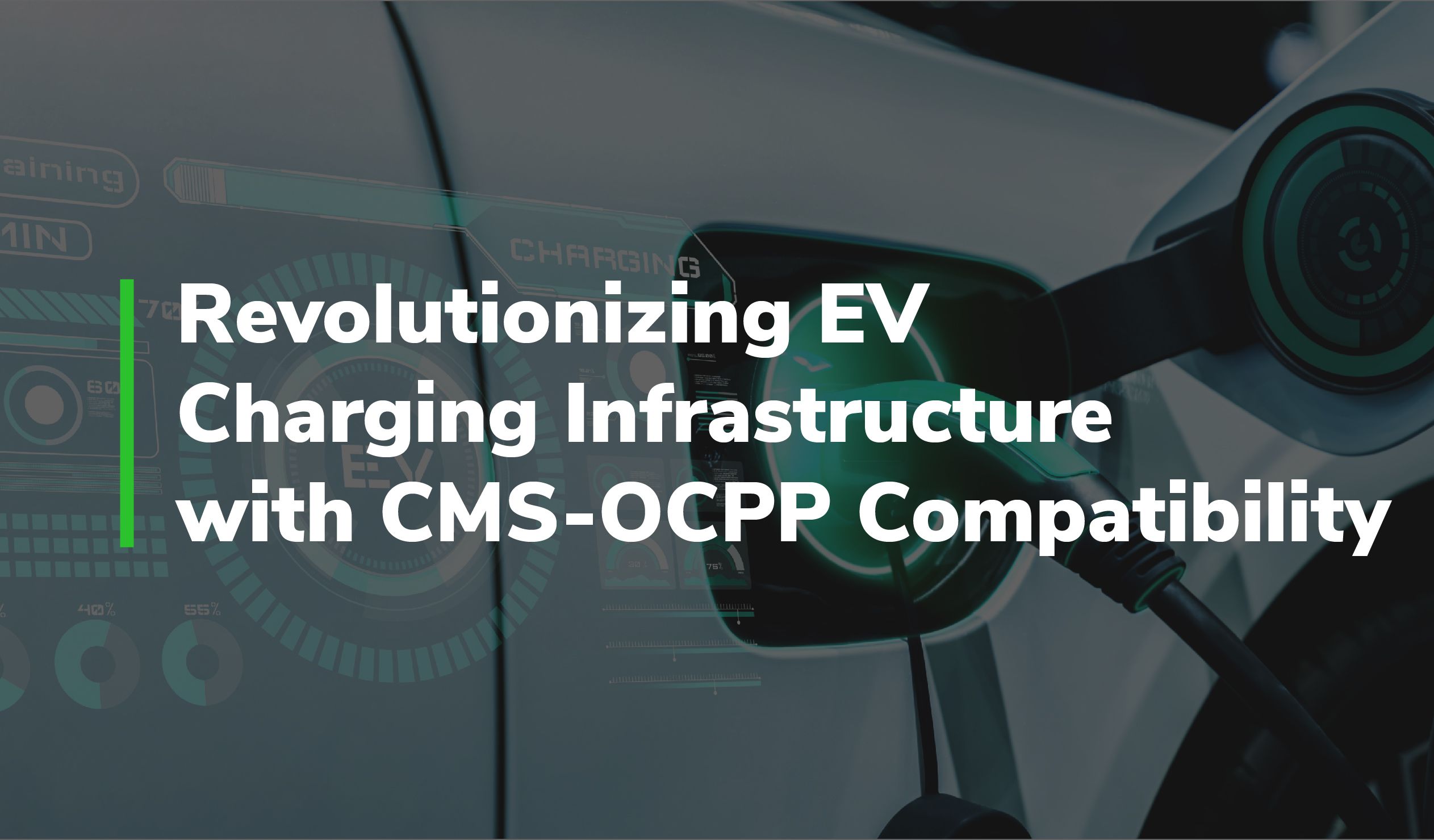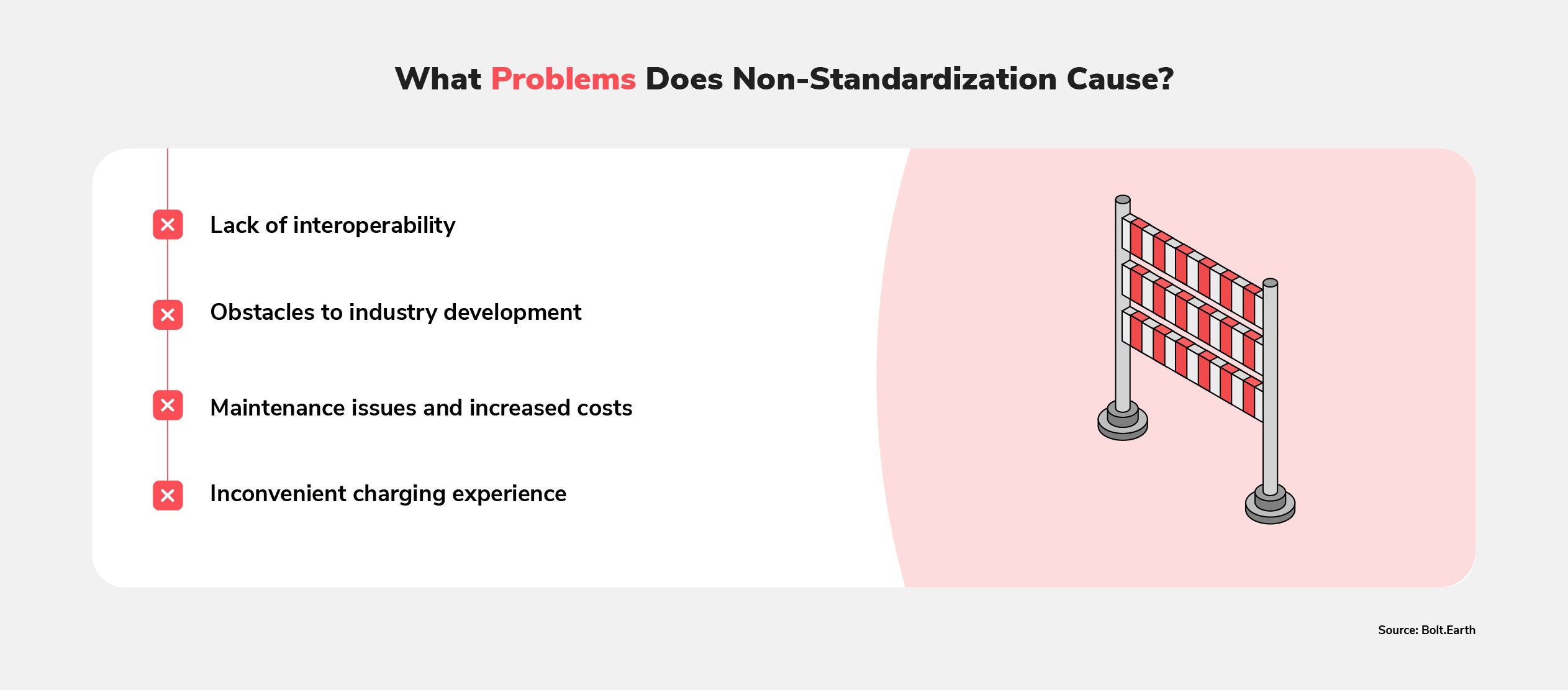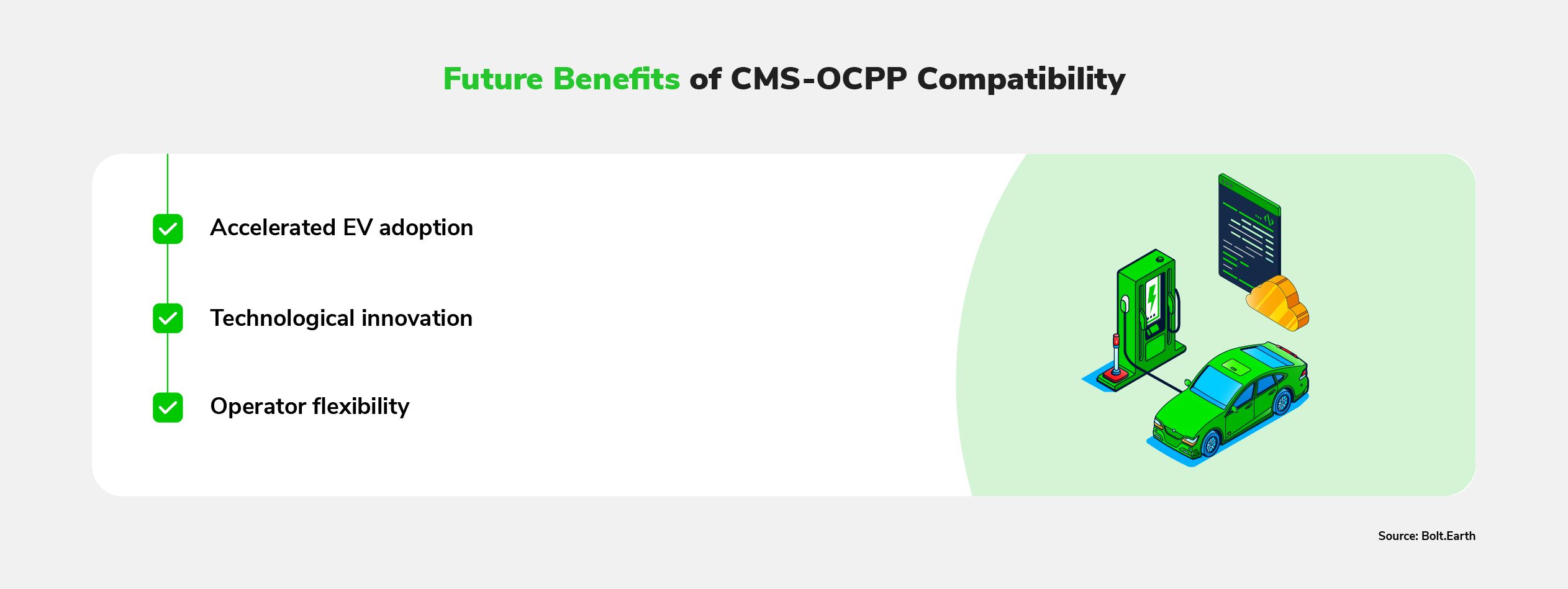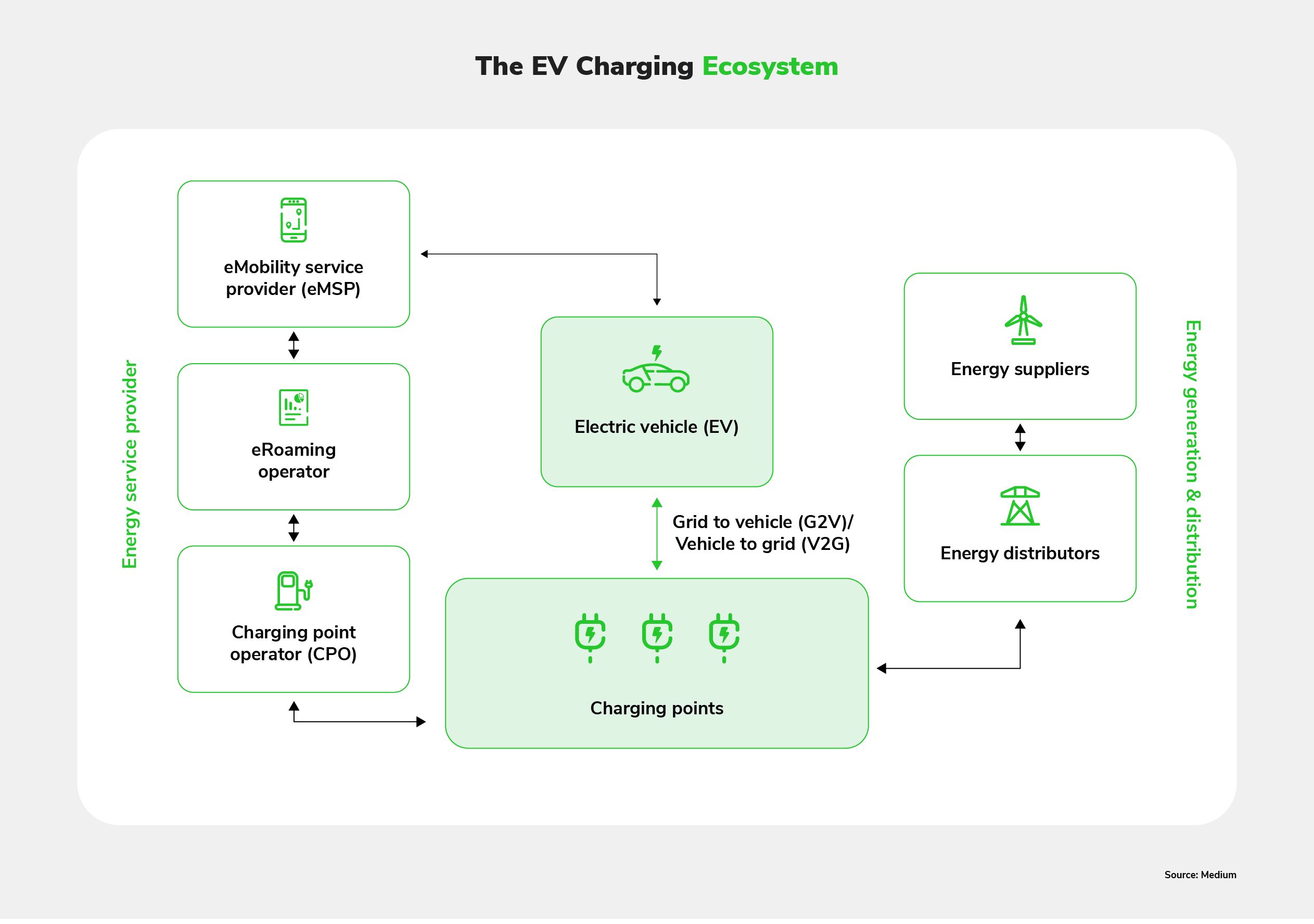How CMS-OCPP Compatibility Can Revolutionize EV Charging Infrastructure
Raghav Bharadwaj
Head of Strategy and Leadership

The electric vehicle (EV) charging ecosystem is widely acknowledged as the key to EV adoption. At the core of this ecosystem lies the software that seamlessly connects and manages each function from end to end. This is called charger management software (CMS). A charging standard, also known as a charging protocol, is used to connect CMS with vehicles.
Metaphorically speaking, the CMS is the EV charger’s brain, and the charging protocol is the language it uses to communicate. The Open Charging Points Protocol (OCPP) is intended as a global language for EV chargers, which will ensure the interoperability of the entire EV charging ecosystem.
In this article, we will discuss the importance of OCPP-based CMS to the EV world. In particular, we will address the following questions:
- Why is CMS-OCPP compatibility crucial for the future of electric vehicle charging stations?
- What are the primary challenges posed by the lack of CMS-OCPP compatibility in the current charging station landscape?
- How does Bolt.Earth leverage OCPP standards to streamline the integration of EV charging station components and reduce operational costs for operators?
EV Charging Infrastructure and CMS Integration: The Current Landscape
In the evolving EV landscape, the demand for public charging infrastructure is on the rise; EV users want to match the convenience of conventional vehicle refueling. Globally, there were 2.7 million public charging points by the end of 2022, with over 900 thousand added that year alone. Some EV charging infrastructure even offers advanced features like remote monitoring, user convenience, and data analysis — all made possible by CMS.
The market for EV charging management software platforms is projected to reach $7.50 billion by 2030, showing a robust CAGR of 30.3% from 2023 to 2030. This growth is fueled by the increasing adoption of electric vehicles and the expansion of charging infrastructure. As more players enter the EV charging management software market, the industry is poised for further advancement.
Bolt.Earth stands out as a significant player in the global market, contributing to the technological and market growth of EV charging solutions. The upward trajectory of the EV charging management software sector aligns with the accelerating pace of electric vehicle adoption, highlighting the pivotal role of such platforms in shaping the future of sustainable transportation.
Why CMS-OCPP Compatibility Matters
Right now, there are several charging protocols worldwide, including CHAdeMO, CCS, Type2, NACS, GB/T, and proprietary chargers. These can all be conceptualized as different languages, “spoken” by different brands of chargers. This is where OCPP comes into the picture.
OCPP, which was developed by the Open Charge Alliance (OCA), is considered the de-facto standard for charging infrastructure interoperability among charging equipment manufacturers, software and systems providers, charging network operators and research organizations.
CMS-OCPP compatibility is essential to EV charging, since it promotes the core values of safety, scalability, savings, and simplicity.
- Safety: Open standards minimize security risks.
- Scalability: CMS-OCPP compatibility enhances scalability, offering a common infrastructure accessible to all vehicles, and thereby optimizing costs.
- Savings: Through standardization, R&D expenses decrease, creating a competitive market and reducing supply chain pressures.
- Simplicity: Standardization streamlines legal complexities, encouraging broader adoption and investment in EVs and charging infrastructure.

The Dangers of Non-Standardization
The current lack of standardized protocols and communication technologies poses significant challenges to creating a cohesive and user-friendly charging network.

Lack of Interoperability
Interoperability is the seamless communication and information exchange among various charging stations, EVs, and their supporting systems. It enables EV owners to charge their vehicles at any station, regardless of the manufacturer or service provider. Currently, the lack of interoperability is a significant barrier to the EV market's growth.
One of the key factors contributing to this hurdle is the absence of standardized protocols. Historically, countries developed electrical plugs independently, without a universal standard for prong shape or voltage. For instance, the United States and Canada typically use a 120-volt electrical system, whereas India uses a 230-volt system. This lack of standardization hampers the universal compatibility needed for the smooth functioning of EV charging infrastructure.
Obstacles to Industry Development
Numerous commercial complexities and market risks arise when a single market participant exclusively owns and develops charging technology patents. While the notion of freely adopting proprietary protocols might be appealing, strategic thinkers in successful companies are reluctant to implement a core technology entirely controlled by a competitor. This hesitancy is particularly pronounced when open standards are available, providing each market player with full control over their product developments, market strategies, and future plans. This latter scenario is the healthiest for any industry, fostering the emergence of the best ideas from a diverse talent pool across various companies and stakeholders.
Maintenance Issues and Increased Costs
Non-standardized networks require extensive integration efforts and increased ongoing maintenance, raising overall system complexity and cost. This renders charging stations underutilized, resulting in inefficient energy distribution and increased costs of network operators. It also dissuades stakeholders from investing in charging stations, due to high funding requirements and lack of scalability.
Inconvenient Charging Experience
The absence of standardized protocols in EV chargers results in a frustrating user experience for EV drivers and fleet owners. Without standardized protocols, EV drivers may encounter difficulties in accessing real-time information, hindering trip planning. Moreover, flexibility in supporting various billing models is crucial for stations to provide user-friendly and adaptable billing options.
For fleet operators and mobility services, the absence of standardized protocols restricts their ability to choose from a variety of suppliers and technologies. This limitation hinders their capacity to flexibly grow and technologically future-proof their EV fleet.
Implementing standardized protocols, such as Plug and Charge technology, ensures a seamless and efficient charging experience, eliminating unnecessary authentication steps and fostering a more user-centric and adaptable EV charging ecosystem.
Bridging Incompatibilities with OCPP-Compliant Solutions
As mentioned above, OCPP serves as the link between charging stations and backend or network management software. It facilitates communication between network owners and their charging stations, as well as between the stations and the power grid. An advanced EV charging network enables real-time monitoring, charging status management, dynamic pricing, payment processing, and fault detection. The network management software relays information to the back-office server, facilitating consumer services like billing and access control. For site hosts, it allows pricing and policy setting, utilizing data to understand charging customer behaviors. Charging stations communicate with cars, network operators, and the power utility company.
In essence, OCPP has the potential to make EV charging infrastructure unprecedentedly scalable and user-friendly.
Integrating Hardware and Software
The OCPP-based network serves as a powerful solution to compatibility challenges, enabling seamless collaboration among diverse products and driving the expansion of charging infrastructure. By significantly lowering costs and risks for both charging station hardware and back-end software, OCPP lays a robust foundation for large-scale electrification. The OCA ensures smooth integration through a comprehensive certification process.
Consider a scenario in which charging hardware from different manufacturers needs to be integrated. Using OCPP, charger owners can effortlessly incorporate diverse hardware, ensuring compatibility and reducing development time and costs. This adaptability offers the freedom to choose the most suitable chargers. and ensures continued usability even if a manufacturer goes bankrupt.
This flexibility extends to software integration, offering substantial benefits to various stakeholders. For instance, utilities investing in smart meter infrastructure based on open standards can seamlessly add smart grid applications, addressing specific needs such as outage management, demand response, street light integration, and more.
Moreover, OCPP’s support for swapping control systems adds a layer of convenience, allowing users to record energy usage through a single app. This adaptability empowers users and charge point operators by enabling easy transitions to new OCPP platforms with enhanced features. OCPP aligns dynamically with the evolving needs of the EV charging industry, making it an indispensable solution for real-world compatibility challenges.
Remote Management Efficiency
OCPP empowers product managers by enabling them to manage charging stations remotely, streamlining settings configuration, and troubleshooting processes without requiring physical access.
This remote management is instrumental in facilitating smart functionality. It enables control over user access to the charger and facilitates integration with payment platforms for billing based on power consumption. Additionally, it allows the charge point operator to gather vital information about the charger’s performance. This data is also accessible to user apps, providing vehicle drivers with real-time charger availability information.
Furthermore, if any problems arise, operators can troubleshoot them remotely, and even reset the charger if necessary.
Shaping Tomorrow’s Charging Infrastructure
CMS-OCPP compatibility promises to transform the future of EV charging. CMS plays a pivotal role in optimizing power usage, identifying available charging stations, and streamlining the charging process. Meanwhile, seamless integration with OCPP ensures a standardized communication protocol, driving innovation, competition, and market growth. Going forward, it will significantly improve the user experience, allowing EV owners to utilize a single CMS across various charging stations, irrespective of the manufacturer. Charging station operators will also benefit from streamlined operations and the flexibility to switch between hardware providers without major disruptions.

Accelerated EV Adoption
Combining CMS and OCPP enhances operational efficiency, propelling EV adoption with a seamless, standardized charging experience. The positive correlation between compatibility solutions and increased EV sales signifies a pivotal step toward widespread adoption. This compatibility ensures that diverse charging stations, regardless of manufacturer, can seamlessly communicate via a unified CMS. OCPP-based CMS brings convenience and flexibility, crucial for the growing adoption of electric vehicles.
Imagine a city with charging stations from various manufacturers. OCPP-based CMS could integrate and manage all of those stations on one unified platform. EV owners could navigate and use any station without needing multiple accounts, contributing to a smooth, positive user experience. As more cities adopt this standard, range anxiety diminishes, paving the way for long-distance travel soon.
Technological Innovation
Standardized communication, especially through protocols like OCPP, plays a pivotal role in stimulating innovation in EV technology. When different components of the EV ecosystem communicate through a standardized protocol, developers can more easily create advanced features. OCPP's open standard encourages collaboration among stakeholders to enhance EV capabilities.
The integration of EV charging stations with smart grid applications is one example. With standardized communication, EVs can not only charge but also interact with the grid, enabling features like demand response, load management, and even vehicle-to-grid capabilities.
Another practical case would be the implementation of dynamic pricing in charging stations. With a standardized protocol, the EV charging station can seamlessly communicate with the central management system, adjusting pricing in real time based on factors like demand, electricity costs, or user preferences. This dynamic pricing feature enhances user experience, optimizes charging station utilization, and demonstrates flexibility.
These innovations contribute to the overall efficiency and sustainability of the electric vehicle ecosystem.
Operator Flexibility
The compatibility between CMS and OCPP empowers charging station operators with unprecedented flexibility. Since operators are not tied to a single technology or supplier, they can switch between equipment manufacturers without major disruptions. This enables them to adapt to evolving technologies and select solutions that align with their specific needs, such as charging speed, cost, or specific functionalities.
OCPP-based CMS also contributes to a competitive market environment. Charging station manufacturers are incentivized to improve their products and services to stay competitive. This competition often leads to advancements in technology, cost reductions, and overall improvements in the quality of charging infrastructure.
Imagine a scenario where a charging station operator initially invests in hardware from Manufacturer A. As the EV market evolves, Manufacturer B introduces more advanced and cost-effective charging solutions. With OCPP compatibility, the operator can seamlessly integrate charging stations from Manufacturer B into their existing infrastructure, promoting healthy competition and continuous improvement in the charging ecosystem.
Customized Solutions with Bolt.Earth CMS
Bolt.Earth's Charger Management System (CMS) is a game-changer, facilitating EV adoption and shaping the future of green mobility. With real-time data, remote monitoring, and seamless stakeholder communication, it simplifies charging infrastructure. The CMS is compatible with OCPP chargers, ensuring flexibility, scalability, and a hassle-free experience for users. It provides a comprehensive solution; it offers modular functionality, remote maintenance, an intuitive interface, OTA updates, streamlined communication, and CRUD controls. As a pivotal part of the Bolt.Earth ecosystem, it contributes to a complete, immersive EV experience, supporting dealers, OEMs, fleet managers, and individual users on their EV journeys.
Explore the Future with CMS-OCPP Integration
The partnership between CMS and OCPP is transforming how we charge EVs, making it efficient and innovative. It ensures a smooth and standardized charging experience, making it easier for more people to switch to EVs.
Bolt.Earth’s ground-breaking charging system, which works seamlessly with OCPP, is spearheading the mission to simplify charging, as well as introducing new ideas and improvements. Imagine cities with well-connected charging stations, facilitating EV adoption by providing a top-notch user experience and reducing range anxiety. That’s the Bolt.Earth vision: creating a cleaner future for everyone.
FAQs
What is CMS-OCPP compatibility in EV charging? CMS-OCPP compatibility ensures that charger management software (CMS) can seamlessly communicate with EV charging stations using the Open Charge Point Protocol (OCPP), enabling efficient and standardized interaction.
How does lack of compatibility impact EV users and operators? The lack of compatibility limits EV users’ charging options, leading to inconvenience. For operators, it hinders the seamless integration and management of diverse charging stations, increasing operational challenges.
How does OCPP-compliant software benefit charging stations? OCPP-compliant software benefits charging stations by streamlining operations. It allows real-time monitoring, remote management, dynamic pricing, payment processing, and fault detection, enhancing overall efficiency.
How does CMS-OCPP integration facilitate technological innovation? CMS-OCPP integration facilitates technological innovation by enabling standardized communication. This allows developers to create advanced functionalities, such as dynamic pricing, load management, and vehicle-to-grid capabilities, promoting continuous advancements in EV technology.
What advantages does OCPP offer in managing charging stations? OCPP promotes safety, scalability, savings, and simplicity. It streamlines universal security practices, reduces R&D expenses, and simplifies legal complexities.
Resources
OCA: Importance of Open Charge Point Protocol for the Electric Vehicle Industry Learn about OCPPs’ advantages over proprietary protocols here.
ABB: White Paper | Standards and interoperability: Scaling EV charging infrastructure Discover how OCPP benefits EV charging stations here.
NARUC: Electric Vehicle Interoperability Considerations for Public Utility Regulators Get a detailed understanding of EV interoperability issues here.
IEA: Trends in charging infrastructure Understand the current landscape of EV charging stations here.




